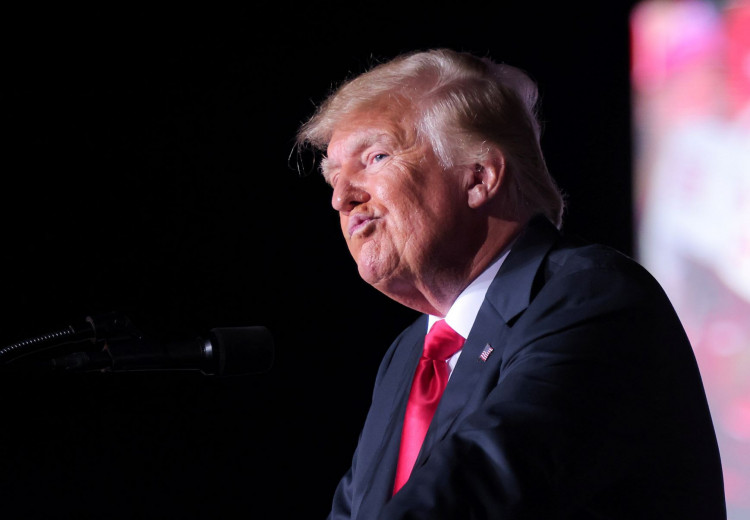President Donald Trump's suggestion that the United States take control of Gaza and transform it into a luxury destination has drawn widespread condemnation from world leaders, including U.S. allies, as his administration scrambles to clarify elements of the plan.
Trump, a former real estate developer, likened Gaza's Mediterranean coastline to prime waterfront property, calling it a potential "Riviera" and arguing that the bombed-out territory could be rebuilt into a thriving tourist hub. "You know, as a developer, [Gaza] could be the most beautiful place-the weather, the water, the whole thing, the climate," Trump said in an October interview with talk show host Hugh Hewitt, a sentiment he echoed this week while welcoming Israeli Prime Minister Benjamin Netanyahu to the White House.
His remarks have sparked fierce criticism from U.S. lawmakers, global leaders, and human rights organizations. "I thought we voted for America First," Senator Rand Paul (R., Ky.) wrote on X. "We have no business contemplating yet another occupation to doom our treasure and spill our soldiers' blood."
White House Walks Back Elements of Plan
Amid backlash, administration officials moved to clarify aspects of Trump's proposal. White House Press Secretary Karoline Leavitt described it as "outside-the-box" thinking but stressed that Trump had not committed to deploying "boots on the ground." However, she declined to rule out the use of U.S. troops in Gaza.
U.S. Secretary of State Marco Rubio also downplayed elements of the plan, stating that any relocation of Gazans would be "temporary" to allow for rebuilding efforts. This contradicts Trump's earlier assertion that Palestinians should be permanently resettled in neighboring countries.
Trump's son-in-law and former senior adviser, Jared Kushner, has previously championed similar ideas. In 2020, he co-authored a Middle East peace plan that described Gaza as having "rich potential tourism opportunities" and suggested it could be transformed into a coastal economic hub akin to Tel Aviv, Hong Kong, or Rio de Janeiro.
International Condemnation and Regional Tensions
Trump's remarks have been met with strong opposition from foreign governments. Saudi Arabia, a key U.S. ally in the Middle East, rejected the proposal outright. The kingdom's foreign ministry reiterated its position that Palestinians should not be displaced, stating that Crown Prince Mohammed bin Salman had made this clear "in a clear and explicit manner."
Germany, Russia, and China also condemned the plan, with the German government warning that it would create "new suffering and new hatred." In Jordan, King Abdullah rejected any moves to annex land or force Palestinians from their territory, while Egypt reaffirmed its commitment to rebuilding Gaza without mass displacement.
Palestinians in Gaza reacted angrily to Trump's statements. "Trump can go to hell, with his ideas, with his money, and with his beliefs. We are going nowhere. We are not some of his assets," said Samir Abu Basel, a father of five displaced by the war.
Political and Legal Challenges
Trump's proposal has also raised concerns about potential violations of international law. Human rights groups have labeled his rhetoric as advocating "ethnic cleansing," while legal experts say the U.S. taking control of Gaza could breach United Nations resolutions.
Within the U.S., Trump's own party appears divided. While some Republicans have praised his willingness to take bold action, others have expressed skepticism.
Trump's proposal also contradicts longstanding U.S. policy, which has supported a two-state solution for Israel and Palestine. The United Nations and most Western governments continue to back a framework in which Gaza would become part of a future Palestinian state.
Implications for U.S.-Israel Relations
Netanyahu, who met separately with U.S. Vice President J.D. Vance, has not directly commented on Trump's plan but expressed appreciation for his administration's support of Israel. The Israeli leader has repeatedly vowed to prevent Hamas from regaining control of Gaza but has stopped short of endorsing any U.S. takeover.
Israeli far-right leaders, however, have voiced support for Palestinian relocation. Former National Security Minister Itamar Ben-Gvir called for Netanyahu to "immediately" implement policies that encourage Gazans to emigrate.
Trump's remarks also come amid negotiations involving Israel, Hamas, and the U.S. over a long-term ceasefire agreement and hostage releases. It remains unclear whether his comments will impact ongoing talks.
Expanding Trump's Expansionist Rhetoric
The Gaza proposal is the latest in a series of expansionist remarks from Trump since returning to office on Jan. 20. In recent weeks, he has suggested a U.S. takeover of Greenland, the seizure of the Panama Canal, and making Canada the 51st state.
Critics argue that such rhetoric risks emboldening authoritarian regimes. Some foreign policy analysts have warned that Trump's words could justify Russia's invasion of Ukraine or China's potential aggression toward Taiwan.
United Nations Secretary-General António Guterres urged caution, telling Trump, "In the search for solutions, we must not make the problem worse. It is essential to avoid any form of 'ethnic cleansing.'"






